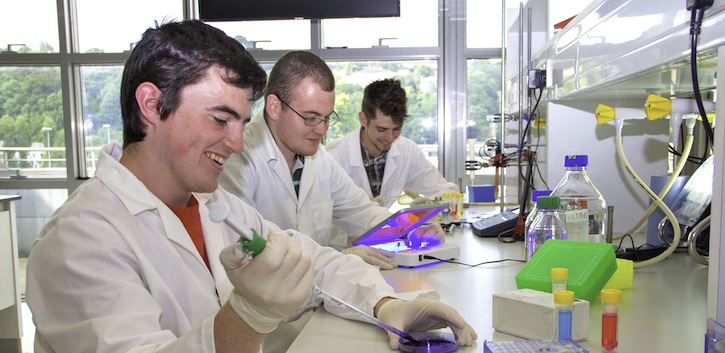2014 Press Releases
$30,000 for student biology startup

A synthetic biology start-up formed by UCC students has been awarded $30,000 in venture capital funding. The start-up, named Benthic Labs, includes students of genetics, biochemistry, and biomedical science, among others.
(Reproduced courtesy of the Irish Examiner)
UCC Students Awarded Venture Capital To Form Synthetic Biology Start-up
By Eoin Gubbins
A synthetic biology start-up formed by UCC students has been awarded $30,000 in venture capital funding. The start-up, named Benthic Labs, includes students of genetics, biochemistry, and biomedical science, among others.
Dr Paul Young and Professor Tommie McCarthy of UCC’s School of Biochemistry and Cell Biology will provide mentorship for the project. The funding, provided by the SynBio axlr8r programme, will enable the students to pursue a research project aimed at using existing knowledge of biology to produce new innovations.
“With synthetic biology we are really saying, OK, we know how various parts of a biological system work, now how can we use these parts to build something new and useful, that doesn’t exist in nature?” said Dr Young.
The team has main two aims. One strand will focus on engineering bacteria to detect DNA from pathogenic viruses such as Human Pappilomavirus, which causes cervical cancer.
“Our hope is that the bacteria could do this in a way that is ultra-cheap and doesn’t require sophisticated lab equipment. This could then be used in developing countries where health facilities are inadequate and expensive diagnostic tests are not available.”
The second strand of the project will aim to create a new biopolymer, or naturally occurring material, by engineering hagfish genes into bacterial cells. Hagfish produce mucus which, when mixed with seawater, creates slime composed of thin but strong and flexible fibres, and can clog the gills of predators.
UCC’s researchers are hoping it has other applications. “The fibres are 10 times stronger than nylon and even Kevlar, but are 100 times thinner than a human hair,” said Dr Young.
“Potential novel applications include the use of the biopolymer as a suture in delicate surgeries, fabric for the textile industry, or an antimicrobial aerosol for surgical instruments and implants, to name but a few.”
The group intend to enter their project in the International Genetically Engineered Machine (iGEM) competition in Boston in November. iGEM will feature 245 teams from leading world universities.
Dr Young said he would have loved to participate in the competition as a student and that, “iGEM is all about young, smart, enthusiastic people from different backgrounds working together on a project.”
Gavin King, biochemistry student and member of the team, expressed excitement at the prospect of contributing to the field of synthetic biology, which, “could possibly help others and solve some of the major problems in the world today.”
